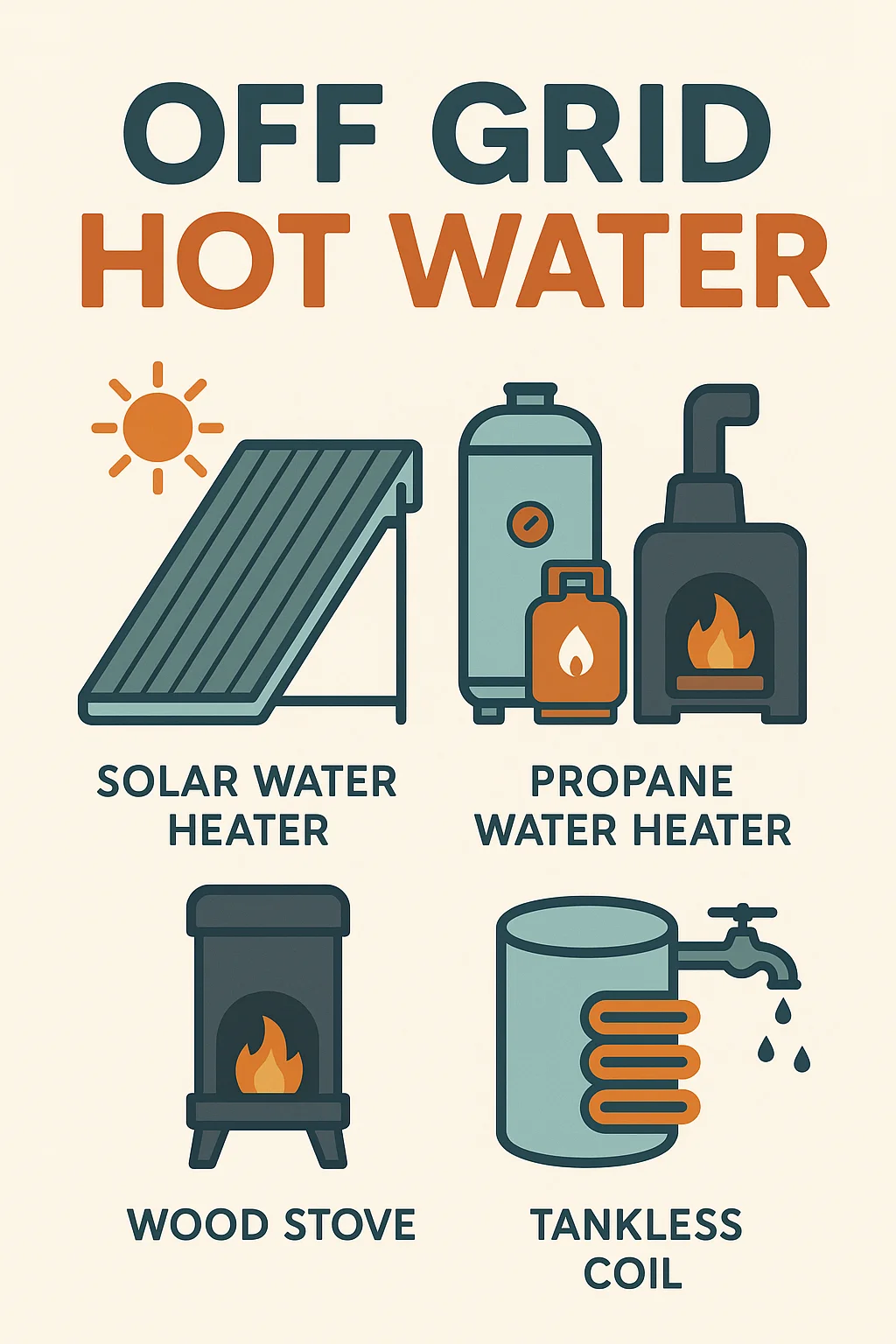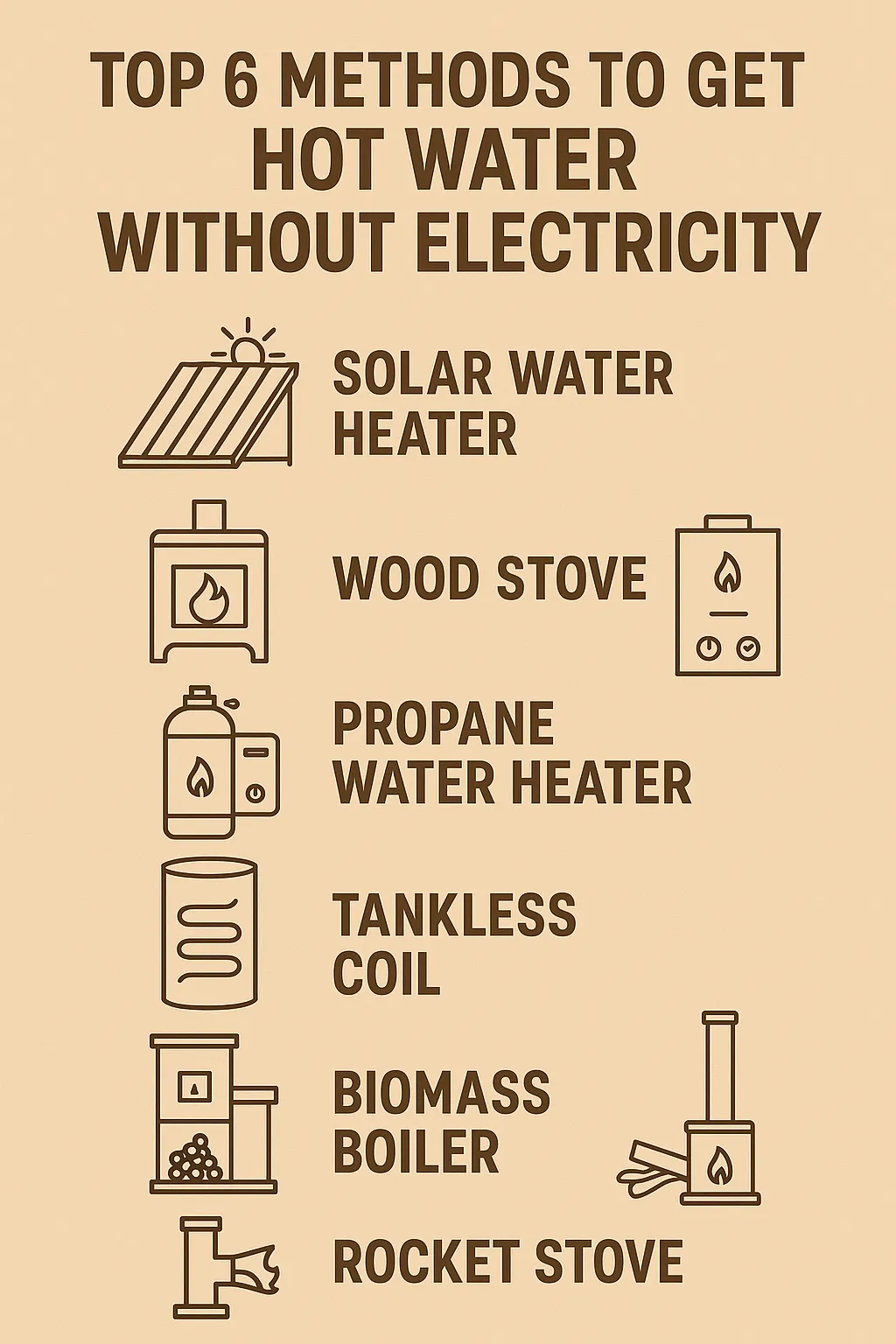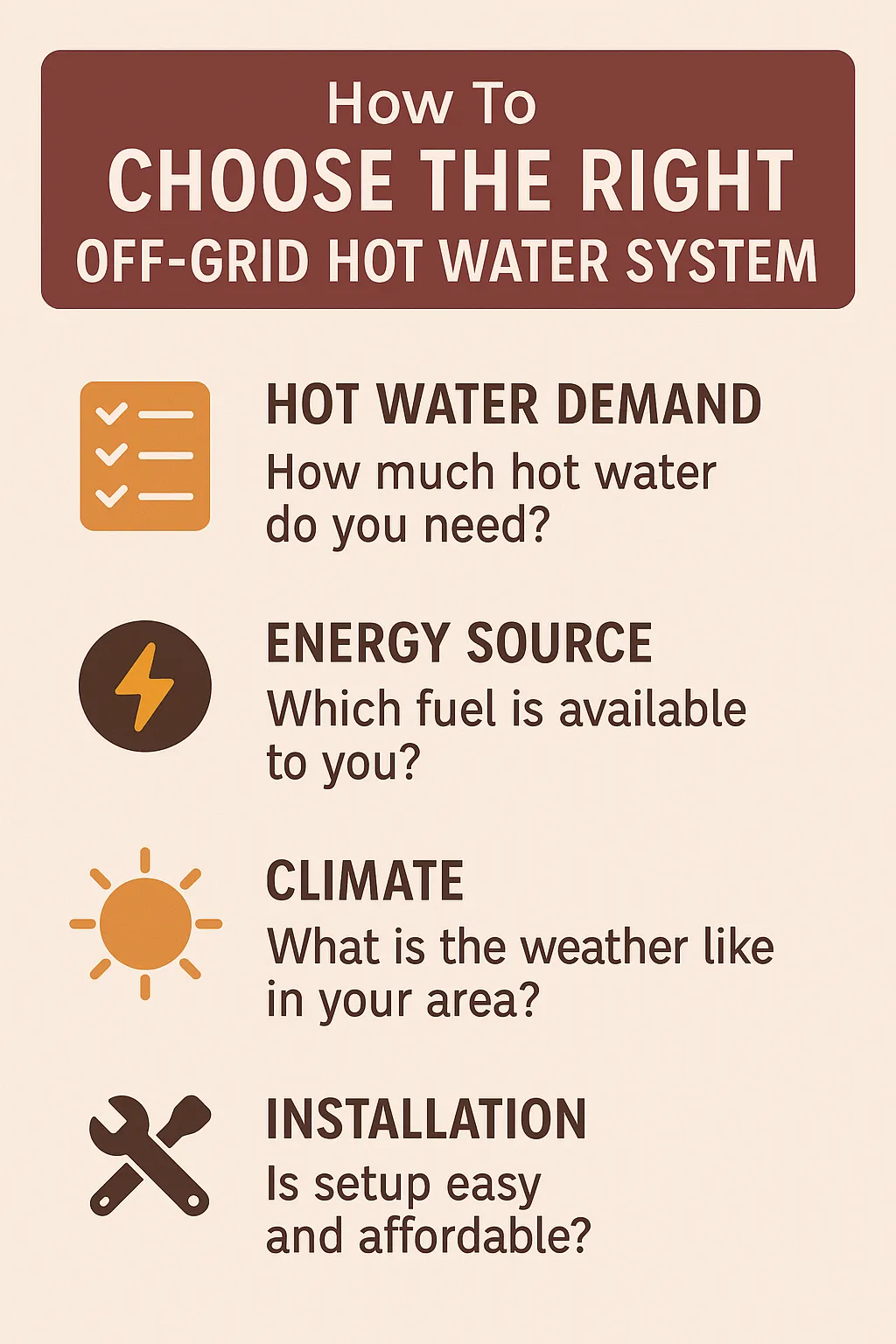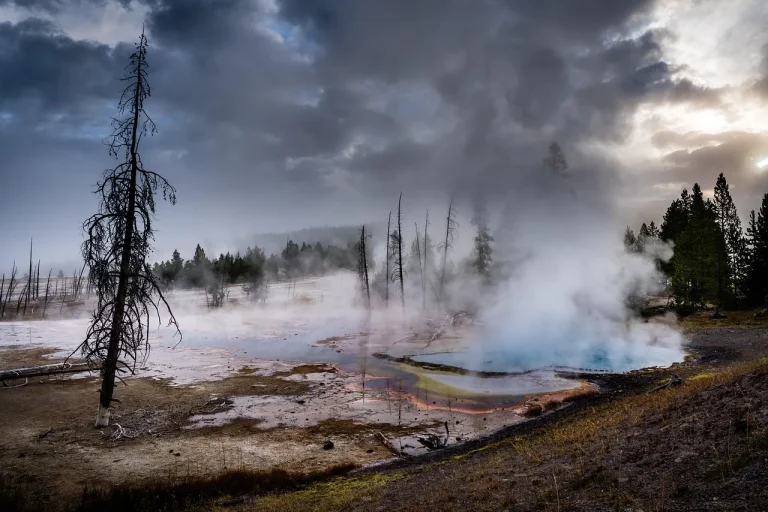Off grid hot water is one of the most essential yet overlooked parts of sustainable living. Without access to electricity, having a dependable way to heat water can make or break your comfort and hygiene standards. In this guide, you’ll discover how to set up your own endless hot water system—no power grid needed.

Why Hot Water Off The Grid Matters More Than Ever
Picture this: You wake up in your off-grid cabin. The wind hums outside, the fire is crackling softly—and you step into a shower with water that’s perfectly warm. No power grid. No electric bills. Just smart planning. If you’ve chosen the off-grid lifestyle, you already value independence. And there’s something deeply satisfying about providing hot water for yourself and your family without relying on outside systems.
Hot water is more than a luxury. It’s essential for daily hygiene, cooking, sanitation, and even emotional well-being. Whether you’re homesteading, prepping for emergencies, or simply cutting ties with the modern grid, learning how to heat water without electricity is a critical step toward self-reliance.
Understanding the Basics of Off Grid Hot Water Systems
What Makes a System “Off-Grid”?
An off-grid water heating system works independently of public utilities. It doesn’t require electric lines or gas hookups. Instead, it runs on renewable or manually managed sources like solar, firewood, or propane. These systems are designed to work even in remote areas, offering peace of mind and resilience.
Energy Sources for Off-Grid Heating
Here are the most common fuels and methods used:
- Solar thermal energy: Uses sunlight to heat water in tubes or panels
- Wood combustion: Includes rocket stoves, mass heaters, or wood-burning stoves
- Propane fuel: Often used in portable or on-demand water heaters
- Passive heating: Utilizes sunlight through dark containers (solar batch heaters)
- Hybrid solutions: Combine multiple sources for seasonal adaptability
Top 6 Methods to Get Hot Water Without Electricity

1. Solar Water Heating (Thermal Collectors)
Solar thermal collectors absorb sunlight to heat water directly. These systems include tubes or panels connected to a storage tank.
Pros:
- Renewable and free energy
- Environmentally friendly
Cons:
- High upfront costs
- Less effective during cloudy or winter months
2. Rocket Mass Heater With Water Coil
Rocket mass heaters are high-efficiency wood stoves. When combined with a copper water coil, they can heat water while warming your space.
Pros:
- Uses less wood than traditional stoves
- Dual purpose: space and water heating
Cons:
- Requires building and maintenance skills
- Needs frequent supervision during use
3. Wood Stove Water Heating
This method involves placing a copper coil or tank near or on top of a wood stove.
Pros:
- Low-cost DIY solution
- Compatible with existing stoves
Cons:
- Slower heating time
- Limited to stove’s heat output
4. Solar Shower Bags (Gravity-Fed)
Solar shower bags are black bags filled with water and left in the sun.
Pros:
- Lightweight and portable
- Perfect for camping or emergencies
Cons:
- Limited water capacity
- No pressure or insulation
5. Propane On-Demand Water Heaters (Battery Ignition)
These heaters warm water instantly and operate on battery ignition, requiring no electricity.
Pros:
- Fast and reliable
- Operates year-round
Cons:
- Requires propane tank refills
- Higher long-term cost
6. Black Barrel or DIY Solar Batch Heater
Paint a barrel black, fill it with water, and let the sun do the rest.
Pros:
- Very affordable
- Simple to build and use
Cons:
- Limited to sunny days
- No temperature control
Hot water is just the beginning. To fully master off-grid living, you need to understand how to build systems that support your lifestyle from the ground up.
👉 The Self-Sufficient Backyard is a field-tested blueprint written by people living completely off the grid. This guide walks you through building energy systems, growing food, harvesting rainwater, and—yes—getting hot water without electricity. Don’t waste years experimenting. Use what already works.
How To Choose the Right Off Grid Hot Water System
Not all methods work for every situation. Here are some key considerations:

- Climate: Solar systems thrive in sunny areas but may struggle in the north
- Budget: Some systems (like propane heaters) are fast but costly over time
- Skill Level: DIYers may love rocket heaters; beginners might prefer solar bags
- Hot Water Usage: Larger families need more efficient or hybrid systems
Comparison Table:
| Method | Best For | Cost | DIY-Friendly | Year-Round Use |
|---|---|---|---|---|
| Solar Water Heater | Sunny climates | $$$ | Medium | Partial |
| Rocket Mass Heater | Cold climates, DIYers | $$ | High | Yes |
| Wood Stove + Coil | Winter cabins | $ | High | Yes |
| Solar Shower Bag | Camping, Emergencies | $ | Yes | No |
| Propane Tankless Heater | Reliable all-around use | $$ | Yes | Yes |
| DIY Solar Batch Heater | Hot, sunny locations | $ | Yes | Partial |
Safety Tips and Maintenance Guidelines
Keeping your system safe is essential:
- Vent combustion units properly to avoid carbon monoxide buildup
- Insulate pipes to prevent freezing
- Check pressure valves regularly
- Clean tanks and coils to avoid scaling or contamination
DIY Off Grid Hot Water Heater Projects (With Recipes & Supplies)
Rocket Stove Heater – Materials List:
| Item | Quantity | Use |
|---|---|---|
| 55-gallon drum | 1 | Main heating body |
| Copper coil | 20 ft | Heat exchanger |
| Fire bricks | 25+ | Build combustion chamber |
| Thermometer | 1 | Monitor water temperature |
| Insulation material | Varies | Increase efficiency |
Assembly Steps:
- Build the combustion chamber with bricks
- Wrap copper coil around the barrel or exhaust
- Connect coil to cold water inlet and storage tank
- Insulate and test for leaks
Product Recommendation: The Self-Sufficient Backyard
The Self-Sufficient Backyard is hands down the best resource for learning how to implement everything you’ve read here—and much more.
Why it’s worth it:
- Detailed plans for building water heaters, storage, and collection systems
- Learn how to combine solar, wood, and thermal mass efficiently
- Includes food growing, energy creation, and off-grid lifestyle tips
Start building your off-grid water system today by learning from those who’ve done it all.
Real-Life Off Grid Hot Water Setups
- Montana Cabin: Rocket mass heater setup heats both water and living room
- Arizona Homestead: Uses black barrel solar system for daily hot showers
- Tiny Home in Oregon: Combines wood stove coil in winter, solar shower bag in summer
FAQ – Off Grid Hot Water Solutions
Can I have hot water year-round off the grid?
Yes, with the right combination of systems (e.g., solar in summer, wood in winter), you can enjoy hot water all year.
What’s the cheapest way to heat water off-grid?
DIY solar batch heaters or solar shower bags are very inexpensive and great for beginners.
Is it safe to heat water without electricity?
Absolutely. Just ensure systems are properly vented, insulated, and regularly maintained.
Can I install these systems myself?
Most systems—like DIY solar heaters or wood stove coils—are beginner-friendly. Just follow safety guidelines.
Conclusion: Hot Water Without the Grid Is Freedom
Living off the grid doesn’t mean giving up hot showers or clean dishes. With a little know-how, you can create a sustainable, reliable hot water supply that works in any environment. Whether you build it yourself or use proven guides, the path to energy independence is within reach.
🔥 Take control of your homestead now. Learn how to set up your full system with The Self-Sufficient Backyard. It’s your blueprint for true freedom.

